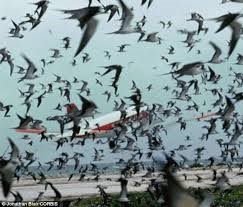Birds like to fly at just two speeds, scientists have found.
The fact has only just come to light despite centuries of humans marvelling at the flight of birds.
The discovery was made by researchers filming budgerigars flying through a tapered tunnel.
Rather than progressively slowing down when the tunnel got narrower, they dropped into a lower ‘cruising speed’.
The findings show birds fly differently to insects, such as bumblebees and honeybees who can progressively slow down or speed up as the mood takes them.
But the study, ‘the birds showed a tendency to fly at only two distinct, fixed speeds.’
The research said: ‘They switched between a high speed in the wider section of the tunnel, and a low speed in the narrower section.
‘The transition between the two speeds was abrupt and anticipatory.’
They added: ‘This is the first observation of the existence of two distinct, preferred flight speeds in birds’
The authors suggest that the ‘dual-speed’ flight strategy is useful for birds to save energy and travel long distances.
But when in a cluttered environment, the slower speed allows them to make safer manoeuvres.
The researchers observed ten different budgies during 80 flights.
The faster speed was and the slower speed was 5.5 metres per second, around 12mph, while the higher speed was 9.5metres per second (21mph).
While a great deal of attention has been paid to how birds migrate over long distances the authors note that how birds cope with the challenges of short-range navigation has had very little attention.
Another advantage of having just two speeds is that it makes it easier for birds to calculate distances to obstacles.
Birds calculate distances by ‘optic flow’ – the motion of objects, surfaces, and edges in their visual fields as they move.
Having just two ‘known’ pre-set speeds, makes it simpler to calibrate the distance to objects for the birds
Over longer distances, previous research suggests that for long distances, birds are also able to fly at an ‘accelerated speed’, faster than their migratory speed, although they cannot maintain this for any length of time.
Source: Daily mail
N.H.Kh

